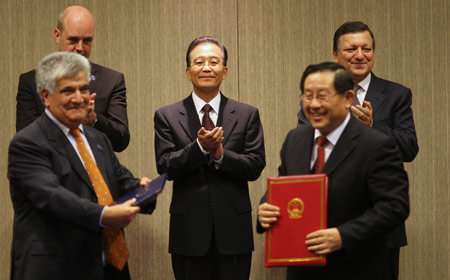China urges EU to cut more carbon
 |
|
Premier Wen Jiabao attends the signing ceremony with Chinese and European Union officials for five agreements between the nation and the European bloc in Nanjing, Jiangsu province on Nov.30.[China Daily] |
Premier Wen Jiabao and European Commission President Jose Manuel Barroso separately announced increased cooperation in battling global warming at the 12th China-EU Summit in Nanjing, capital of East China's Jiangsu province.
China needs to invest "tremendous efforts" to reduce carbon intensity by 40-45 percent by 2020, Wen said, while also urging the EU to show more political will on the global warming front.
"(China's) promise on emissions targets is a serious and solemn one," Wen said at a press conference. "We will take actions and deliver substantial results."
As part of last-ditch efforts to ensure a successful Copenhagen conference, Wen also urged the EU to support calls from developing countries for funds and green technology.
Wen will lead a government delegation at the conference but his schedule is unknown.
In the run-up to the two-week Copenhagen summit that starts on Dec 7, China announced last week that it would curb emissions per unit of gross domestic product by between 40 and 45 percent by 2020 from the 2005 levels. The EU has committed to cutting greenhouse gas emissions by 20 percent by 2020 from the 1990 level, or 30 percent if the United States takes deeper action.
The US has announced that it will cut its carbon dioxide emissions by 17 percent by 2020 from its 2005 level.
Barroso reiterated his call for more substantial emissions reduction commitments from China, the world's leading emitter of heat-trapping greenhouse gas emissions, before next week's climate change talks.
"We cannot negotiate with the reality of climate change," Barroso said. "We are asking all sides to do everything they can to contribute to a comprehensive and global agreement."
Recent pledges on reducing carbon emissions by both China and the US, which together emit about 40 percent of the world's greenhouse gases, were welcome but inadequate, Barroso said.
The premier emphasized China's status as a developing country.
"We are now in a key process of industrialization and urbanization. Both our historical accumulation of carbon dioxide emissions and carbon dioxide emissions per capita are far below developed countries."
Yang Fuqiang, director of global climate change solutions at WWF, said China is still a developing country and it now has to solve more problems in less time compared to developed countries.
Yang said that China is dealing with multiple challenges at the moment.
"Unlike other countries, China is not solving problems one at a time, but is looking after the economy, population, job market, environment and so on. The challenge is enormous," Yang said.
"It is without any international aid that China made such a hefty promise to reduce carbon emissions. But if technology support and funds can be accessible, China might be able to overcome this effort."
Huang Shengchu, president of China Coal Information Institute, said that China needs more technology support on carbon capturing and storage from developed countries.
"China needs to speed up its economic restructuring to achieve the goal while tapping more renewable energy resources," Huang said.
 0 Comments
0 Comments






